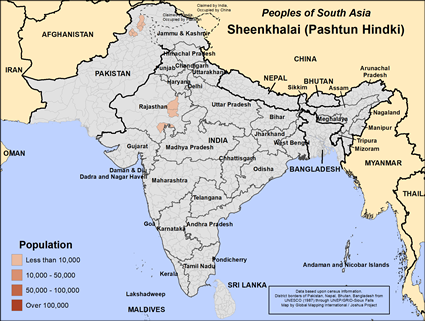Sheenkhalai (Pashtun Hindki) in Pakistan

Send Joshua Project a photo
of this people group. |

Map Source:
People Group data: Omid. Map geography: UNESCO / GMI. Map Design: Joshua Project
|
| People Name: | Sheenkhalai (Pashtun Hindki) |
| Country: | Pakistan |
| 10/40 Window: | Yes |
| Population: | 8,400 |
| World Population: | 10,900 |
| Primary Language: | Pashto, Northern |
| Primary Religion: | Hinduism |
| Christian Adherents: | 0.00 % |
| Evangelicals: | 0.00 % |
| Scripture: | Complete Bible |
| Ministry Resources: | Yes |
| Jesus Film: | Yes |
| Audio Recordings: | Yes |
| People Cluster: | South Asia Hindu - other |
| Affinity Bloc: | South Asian Peoples |
| Progress Level: |
|
Introduction / History
All Pashtun groups share a unique sense of common identity based on four elements: Heritage, Islam, the Pashtunwali Code of Honor, and to some extent, language (Pakhtu or Pashto). A Pashtun's primary loyalty is to his particular social group (tribe, sub-tribe or clan).
Pashto, the language of the Pashtuns, is a complex language. There are many varieties of the one language Pashto. Even women, who have less interaction with outsiders and other language groups, are said to speak a distinctive variety of Pashto.
There are at least 30 major tribes, and countless sub-tribes and clans. One of these in Pakistan is the Sheenkhalai. They speak Northern Pashto, but some have a Hindu background, though they are now Muslim. They live in northern India and northern Pakistan. Their primary language is Northern Pashto. The complete Northern Pashto Bible became available in 2019.
What Are Their Lives Like?
Pashtuns in Pakistan (including the Sheenkhalai) have a low literacy rate, which holds them back economically. Those who have a good education often work as professionals or with government agencies, especially police departments. Those in rural areas sometimes earn a good income by renting out family-owned farmland or selling horses. The rural poor among them suffer from unsanitary conditions caused mainly by poor water and lack of access to modern medicine. The main occupations of rural Sheenkhalai are animal husbandry and agriculture.
Honor and conversely, shame refer not to personal feelings or a psychological state, but to one's public reputation in the eyes of others. In a collectivistic society like the Pashtun, where community is emphasized over individualism, a person's identity is defined by his/her group. Everything one does is a matter of honor. Where you sit at a meal, who you marry, where you work, how you make decisions or spend money, all are affected by social expectations, and in turn affect one's reputation (honor). Although the practice of Pashtunwali may be decreasing among urban Pashtuns, it remains a unifying theme.
Women are both the weakest link, and most important symbol, of the honor of any Pashtun man, family, and tribe. For a woman, honor is equated with modesty. The notion of modesty involves far more than dress and includes the total demeanor of a woman and her submission to the men (father, husband, brothers) in her family. A Pashtun man may have up to four wives if he can afford them. Children, especially boys, are seen as blessings from Allah.
What Are Their Beliefs?
Pashtuns are Sunni Muslims including the Sheenkhalai, though they have a Hindu background. Right religious practice tends to be more important than right belief. Actual religious practice and piety vary according to context. As in other parts of the Muslim world, some Pashtuns are cultural Muslims. Others are secular, or non-practicing; still others identify with the mystical tradition of Islam.
Sheenkhalai Pashtuns fear the influence of demons and evil spirits and seek protection by visiting the shrines of Muslim saints. They use amulets and charms and engage in astrology and fortune telling. Driven by felt needs healing, desire for a son, relief from an abusive spouse Sheenkhalai women sometimes turn to folk practices to ward off evil and seek Allah's favor.
What Are Their Needs?
The Sheenkhalai in Pakistan need to be liberated from the spirit world. They need a higher literacy rate so they can thrive in Pakistan's rapidly developing urban economy. Most of all, they need to have their sins forgiven by Isa or Jesus.
Prayer Points
Pray for each subgroup of Pashtuns in Pakistan to have a movement to Christ which will bless them economically and spiritually.
Ask God's Spirit to soften hearts to the truth of the gospel, to confirm the word with signs and wonders,
Ask God to anoint, and grant wisdom, favor and fruitfulness to workers and agencies focused on the Sheenkhalai.
Most Sheenkhalai women are troubled by fears and have deep needs. Ask God to touch their hearts, especially through radio and television, and to help them put their faith in the Almighty Savior Jesus.